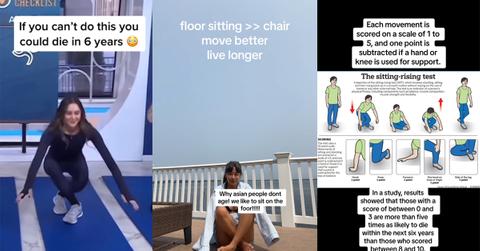The "Sitting-Rising" Test Has Some Folks Fearing for Their Lives — Here's What It Means
Published Sept. 11 2023, 5:09 p.m. ET
If you're especially paranoid about being sick or having a disease, you're probably frantically checking WebMD or the first Google result you find in order to see how sick you actually are. You've probably gone through whole lists of symptoms to see if anything lines up with something you're experiencing in your body. You're better off visiting a doctor if you're able, but by and large, you probably shouldn't self-diagnose yourself with something outlandishly serious.
However, this test claims to be a good indicator of your overall health. Known as the "sitting-rising" or "sit-to-stand," the at-home physical challenge is reportedly backed by scientific evidence and can supposedly be a good tracker for your physical health. In fact, it even claims to be able to calculate your chances of dying. Let's see what people have to say about this test.
What is the sitting-rising test?
The sitting-rising test was first popularized by a March 2023 report by the Today show, but the test subsequently made the rounds on TikTok later in July 2023. It's a physical challenge that anyone can try at home, but it's also allegedly an indicator of how long one may have to live.
Put simply, one must sit on the ground with their legs folded and then rise back to their feet with their legs still crossed. Ideally, you want to accomplish this without using any part of your body but your legs and core.
Versions of this test even include a scoring system. Participants start with 10 points and lose one point for certain actions. Using your hands and knees to get up each cost 1 point, for example.
According to these results, people who score between 0 and 3 are five times more likely to die within the next six years than those who score from 8 to 10.
In the report by the Today show, Dr. Natalie Azar mentions that the results of the sitting-rising test were based on a 2012 study that strove to predict the mortality of participants between 51 and 80 years of age. However, she also advised younger folks who couldn't do it to "take stock" of their overall health.
"Ask yourself: how can I improve core strength, leg strength, balance, and agility?" she advised, via Today.
If you're especially worrisome, you may have found yourself trying this test out for yourself just now. No matter what your results are, though, things like this should be taken with a grain of salt.
Commenters on TikTok already claim that the results of the test aren't wholly indicative of your lifespan.
One person claimed, "I couldn't do this when I was a kid. I'm in my 40s now. I guess I should be dead."
On a similar note, one person commented that they couldn't do this 15 years ago.
Another person joked, "I have arthritis in both knees. I'm going to die."
It's never a bad idea to to regular check-ins on your health to see how you're feeling and what you might be able to improve. The sitting-rising test isn't exactly a proper diagnosis, but it might be able to tell you things about your lifestyle that you could stand to address.



